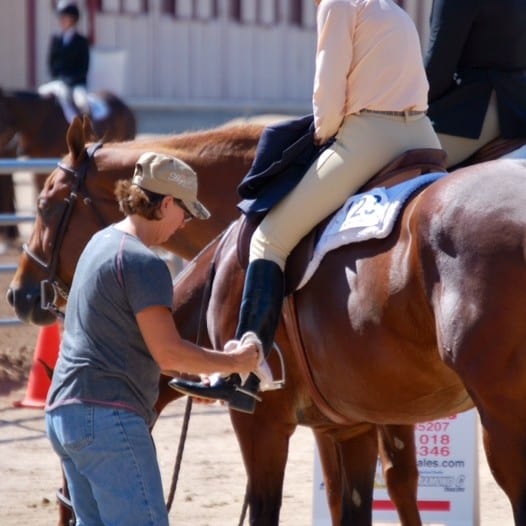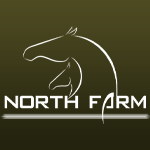Iconic 70’s rock band, The Clash, once famously sang the question, Should I stay or should I go?, about an often-inevitable fork in the road that can happen in any kind of relationship: wondering about ending things. We’ve all been there, maybe we’re unhappy with a bad ride at a show or simply wondering what else is out there. You may feel stuck between action or just sticking it out in hopes that things will improve eventually.
No matter your reasons for feeling this way, it comes down to a little introspection. Talking yourself through the situation will either make your situation better or help you to make the right choice for your life, so we talked about trainer-client relationships with horse industry veteran Gretchen Mathes to get some perspective. Get a leg up on your reflection process by reading on for five questions you might want to ask yourself before ending your relationship with a trainer.
Mathes has 40 plus years of training and showing experience under her belt; she’s coached World and Congress Champions in many events and was once named AQHA Horsewoman of the Year by the Professional Horseman’s Committee. Mathes is proud of the trainer-client relationships she’s fostered over the years, and her program is known for its team-like culture of support and cooperation.
1. Am I being honest with my trainer and myself?
If you’re finding yourself in the act of questioning your relationship, this is the first sign that something isn’t right. Mathes stresses that it’s important to be honest with both yourself and the people you’re involved with. She says, “I feel that the most important thing in the client-trainer relationship is honesty.”
Are you open and clear about what your goals are, what your expectations are, and what your possible limits may be? Mathes explains, “We as trainers need to be honest about your horse; its ability, talent, etc, but it can be hard for a trainer to know how to proceed if a client isn’t open about things.”
 2. Have I listened to my trainer’s advice?
2. Have I listened to my trainer’s advice?
We hire horse trainers because we realize they know more about what we’re trying to do with horses. However, you can choose to follow what a trainer says or not. A trainer’s job is to guide you, but they can’t force you to take advice or listen.
Mathes elaborates, “Sometimes, clients don’t listen to their trainers. Let’s say you advise that a horse isn’t ready to go to a certain show or circuit, but the client wants to and goes anyway. That often will not turn out well as there was probably a reason we gave that advice.”
Trainers can see what you might not be able to see. So, ask yourself about things you might be unhappy with and whether or not those were the result of your choices. Remember that your trainer wants you to be successful.
Mathes intones, “Our focus is to get people to work with their horses and to really teach clients how to ride.”
It’s not fair to pin discontent on your trainer if you have consistently not listened to advice or suggestions.
She adds, “If a trainer tells you a horse needs to go to a circuit to just be schooled and ridden in preparation for you in the following months, it is important that you listen. Our best horses that had the most longevity were owned by customers who trusted our decisions throughout the training process.”
3. Are my expectations fair?
Are you expecting more time and attention than other clients in the barn? Different treatment? Are you putting in an equitable amount of practice time at home in terms of what you expect to get at the show?
Mathes shares, “We want team players. Everybody has bad days and problems, but you have to get along. Some people don’t realize that they might be expecting more than what’s a fair share of time and that makes everybody unhappy.”
A trainer can’t be all things to all people, but having clearly defined expectations for your relationship will go a long way toward keeping everybody on the same page.
4. What do I want to achieve?
Mathes relates, “We all need to be honest and we [trainers] try to do a good job. Trainers don’t want to go to a show without having done our homework, and horses can be unpredictable.”
Do you have goals to earn points? Qualify for the World Show? Just have fun? Once you’ve established what you want to achieve, you’ll be better able to measure whether or not your current training relationship can get you there. Further, ask yourself: What are the habits/activities I either need to stop doing, do more of or start doing to help me achieve? What do I need to change my mindset? Who is going to help hold me accountable and provide support, motivation and coaching along the way? This goes back to the #1 question above, being honest with yourself and your trainer.
5. Have I talked to my trainer about concerns?
Mathes expresses, “The worst thing for trainers is when a client isn’t happy and will talk to everybody but the trainer about it. That becomes a really bad situation quickly. It’s uncomfortable if they’re venting to other clients in your barn or other trainers at a show.”
Trust and loyalty are important in any relationship and if you’ve vented displeasure or unhappiness to anybody but your trainer, you’ve broken that trust down and will need to work to repair it. Even if you decide to end your relationship with your trainer, you’ll carry negative baggage into your next training relationship if you don’t work on being a better communicator. Put yourself in your trainer’s boots and imagine how you might feel if they were complaining about you to other clients and trainers.
Trainer-client relationships are like any other, they’re complex and require effort to make them work.
Check out our article “10 Tips for Strengthening the Relationship with Your Trainer” for more tips.
About the Author: A native Michigander, Rachel Kooiker is a lover of horses who loves to write. She competes in all-around Amateur events with her APHA gelding, Hoos Real. She graduated from Grand Valley State University with a BA in English and Psychology and an MA in Curriculum & Instruction. She and her husband Drew operate Kooiker Show Horses, where they stand APHA World Champion Im the Secret.








